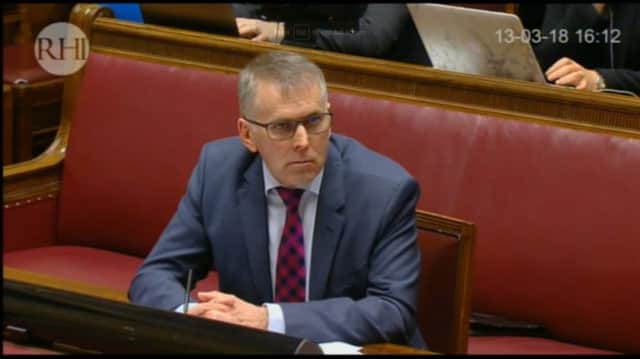Sam McBride: Secrecy is both a current and future concern


If minutes were not taken of important meetings relating to the RHI scheme, as now seems clear, the work of the public inquiry will be more difficult. In one case, the inquiry finds itself for now reliant on two conflicting recollections of what happened during a meeting between Arlene Foster and senior official Fiona Hepper.
That is a matter for the inquiry, whose chairman, Sir Patrick Coghlin, has asked the media to be cautious in how it covers its hearings.
Advertisement
Hide AdAdvertisement
Hide AdBut there is another immediate concern which goes far beyond the terms of the inquiry: In the absence of any ministers, any assembly scrutiny or any other form of democratic accountability, have civil servants retained the “habit” of frustrating the spirit, if not the letter, of the Freedom of Information Act by deliberately not writing down certain important developments?
That situation was raised in Belfast High Court yesterday, where senior judge Sir Paul Girvan referred to “a [Stormont] context where there’s a lack of transparency of how decisions are reached because it might embarrass somebody”.
If that is the case – and Stormont Castle is yet to clarify the situation – it is particularly unsatisfactory in the current democratic vacuum.
There are at least hints of some officials’ apparent aversion to transparency, even in the absence of ministers. Last month the first tier information tribunal threw out a Department for Communities’ attempt to block the release of a report about the development of the Maze prison site.
Advertisement
Hide AdAdvertisement
Hide AdDespite the fact that a minister had released most of the detail of the seven-year-old report, officials engaged a barrister to argue that releasing it could undermine the principle of collective responsibility in the executive, to which the Information Commissioner responded acerbically that there was little evidence of collective responsibility among Stormont ministers, who “frequently and publicly disagree over policy decisions”.
In my experience, the DUP has much deeper hostility to Freedom of Information than has Sinn Féin, something which is somewhat counter intuitive, given the growth of the latter party out of an ultra-secretive paramilitary organisation.
But a source familiar with how parties in the executive operated told me that although there would generally have been officials present where meetings were taking place with the first minister and deputy first minister while they were acting in their ministerial capacity, in “party to party meetings Sinn Féin were always very wary of having officials present and wanted to keep things at a more political level”.
In response, Sinn Féin told me that “there is no reason or rationale for civil servants to attend political party to party meetings. That is solely the business of the respective parties”. The DUP did not respond to questions on the issue.
Advertisement
Hide AdAdvertisement
Hide AdSinn Féin insisted that its ministers “adhered to all protocols relating to the conduct of their ministerial business” and that “if senior civil servants failed to adhere to the protocols governing their conduct then they need to explain why this was the case”.
Given that for a decade it was the DUP and Sinn Féin which controlled Stormont, and given those parties’ propensity for doing business in meetings between powerful Spads or directly between ministers, it now seems that records of many key ministerial decisions – particularly in Stormont Castle – are unlikely to exist.
That has implications for historians, who will in the future – as Sir Patrick is finding in the present – find themselves swimming in a sea of competing verbal claims, without documentary evidence to back it up.